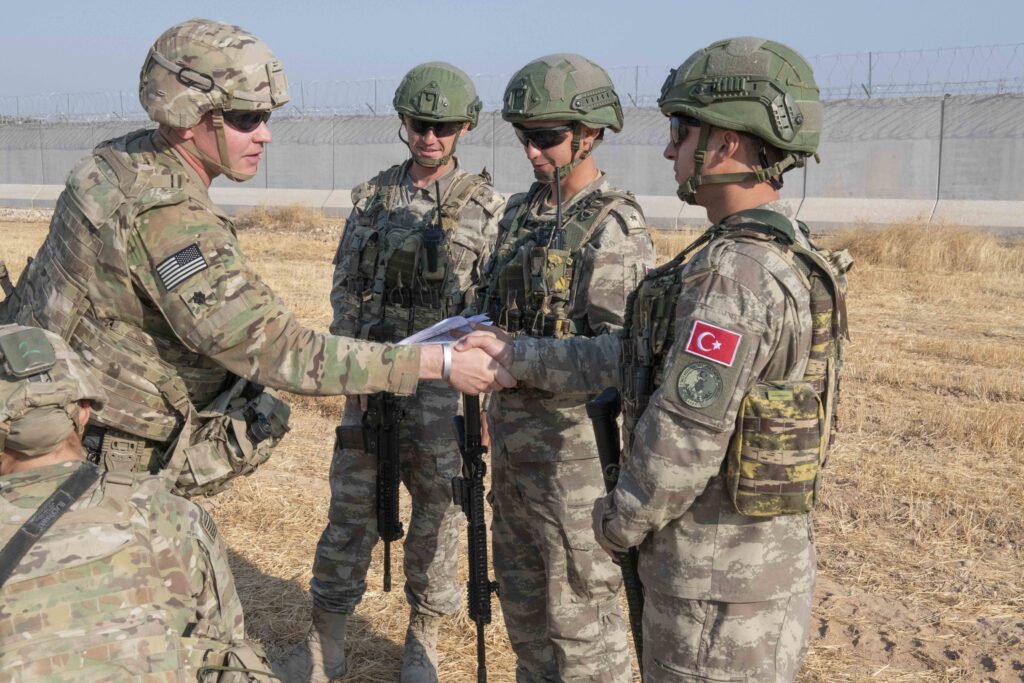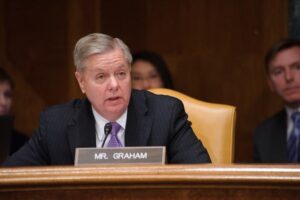US Scrambles As Both Parties Oppose Trump On Kurds
Posted on

US and Turkish forces conduct a joint patrol inside the security mechanism area in northeast Syria, Oct. 4, 2019. (US Army photo)
UPDATED: Adds Senior Administration Official Comments
WASHINGTON: President Trump came under intense bipartisan criticism today from House and Senate leaders today after his surprise decision last night that appeared to green light a Turkish attack on Syria, Kurds, which he appeared to back off from today.
Sunday night the White House said “Turkey will soon be moving forward with its long-planned operation into Northern Syria. The United States Armed Forces will not support or be involved in the operation, and United States forces, having defeated the ISIS territorial ‘Caliphate,’ will no longer be in the immediate area.”
This was interpreted by many lawmakers, analysts and other countries — including many Kurds — as a green light from the administration to Turkey that it could attack areas held by Kurds without fearing US objections.
Below are tweets the president sent this morning, appearing to argue that, at least, US forces would not help the Kurds in any way should the Turks attack.
….almost 3 years, but it is time for us to get out of these ridiculous Endless Wars, many of them tribal, and bring our soldiers home. WE WILL FIGHT WHERE IT IS TO OUR BENEFIT, AND ONLY FIGHT TO WIN. Turkey, Europe, Syria, Iran, Iraq, Russia and the Kurds will now have to…..
— Donald J. Trump (@realDonaldTrump) October 7, 2019
Soon after, statements from angry lawmakers began flooding in. The Pentagon quickly dispatched a statement flatly rejecting Turkish military action. Then the president also backed away, tweeting he could “totally destroy and obliterate the Economy of Turkey,” if they do anything he would “consider to be off limits.”
In a move that underscored the Pentagon’s seriousness, the US removed Turkey from a mechanism known as the Air Tasking Order today, which allows allied militaries flying over Syria to share information. Removal essentially blinds Turkish air operations over northern Syria, creating a dangerous situation for Turkish planes should they begin bombing Kurdish positions in northern Syria because they won’t know which allied planes are flying where and when.
ADD BEGINS HERE Speaking with reporters Monday afternoon, a senior administration official expressed surprise that anyone would interpret the president’s words as support for a Turkish incursion.
While the 50 to 100 US troops in northern Syria are currently being moved to other bases in the country, “this does not constitute a withdrawal from Syria,” the official said. That’s true. But the Kurds are only in northeast Syria. The US has about 1,000 troops spread over several small bases in Syria. “The fact that we’re removing them is not a green light,” for Turkey, the official added.ADD ENDS
The policy whiplash roiled Washington the same day as House Democrats subpoenaed Pentagon chief Mark Esper and the acting director of the Office of Management and Budget in the ongoing impeachment probe centering on Trump’s conversations with Ukrainian officials, adding another major distraction at a time when Congress is attempting to pass the already delayed fiscal year 2020 budget.
The subpoenas come days after the Pentagon’s top lawyer ordered the collection of all documents related to the Ukraine military aid at the center of the House impeachment investigation.
On Turkey, Senate Majority Leader Mitch McConnell said any US pullout from Syria “would only benefit Russia, Iran, and the Assad regime. And it would increase the risk that ISIS and other terrorist groups regroup.”
The most significant break with Trump’s decision to OK Turkey’s attacks came from Sen. Lindsey Graham, who pledged to work with Democrat Chris Van Hollen to introduce a new round of bipartisan sanctions against Turkey should they invade. Graham tweeted that the measure would “call for their suspension from NATO if they attack Kurdish forces who assisted the U.S. in the destruction of the ISIS Caliphate.” He added his “hope” that any sanctions “would be veto-proof.”

Sen. Lindsey Graham
Turkish Ambassador to the US Serdar Kilic shot back at Graham on Twitter, asking “Dear Senator, are you suggesting that supporting YPG/PYD/PKK to establish a terror corridor on Turkey’s border will better serve US interests? Is the wise decision you expect President Trump to make is continuing with the US support to the existential threat imposed on a key Ally?”
A bipartisan group of House members who sit on the Armed Services, Foreign Affairs, and Intelligence Committees — Elise Stefanik, Jason Crow, Abigail Spanberger, and Chrissy Houlahan released a stinging statement calling the White House’s decision to withdraw US troops a “misguided and catastrophic blow to our national security interests. Not only will this decision further destabilize the region, it will make it more difficult for the United States to recruit allies and partners to defeat terrorist groups like ISIS.”
The French and German foreign ministries, while not criticizing Trump, issued statements warning Turkey to hold its fire.
The United States can’t unilaterally suspend a NATO member, because the alliance works on consensus, so we believe every member would have to approve of expelling Turkey.
The Pentagon and State Department spent much of Monday scrambling to respond to the White House’s surprise announcement Sunday night, which came three days after Defense Secretary Mark Esper told reporters he spoke with Turkish Defense Minister Hulusi Akar, and reached an agreement on joint US/Turkish patrols in northern Syria. “I made very clear to him, and he agreed as well, that we need to make the security mechanism work,” Esper said. “I just told him, let’s keep working at it. That’s the best path forward for all of us, so that’s what I’m focused on right now.”
Monday afternoon, Esper tweeted: “DoD does not endorse a Turkish operation in Northern Syria. We will work w/our @NATO allies & Coalition partners to reiterate to Turkey the possible destabilizing consequences of potential actions to Turkey, the region, & beyond.”
Esper’s tweet was later deleted, though a similar tweet by Pentagon spokesman Jonathan Rath Hoffman remains up.
The US policy toward Syria and the Kurds has been a moving target for the better part of four years, going back to the Obama administration. Turkey has a long and often vicious relationship with the Kurds, whose existence and persistent demands for autonomy of some sort have riled every Turkish leader since Ataturk.
Defense Secretary Jim Mattis and Syria envoy Brett McGurk resigned in December after Trump’s first demand for a US withdrawal from Syria, which he later reversed.
Subscribe to our newsletter
Promotions, new products and sales. Directly to your inbox.
